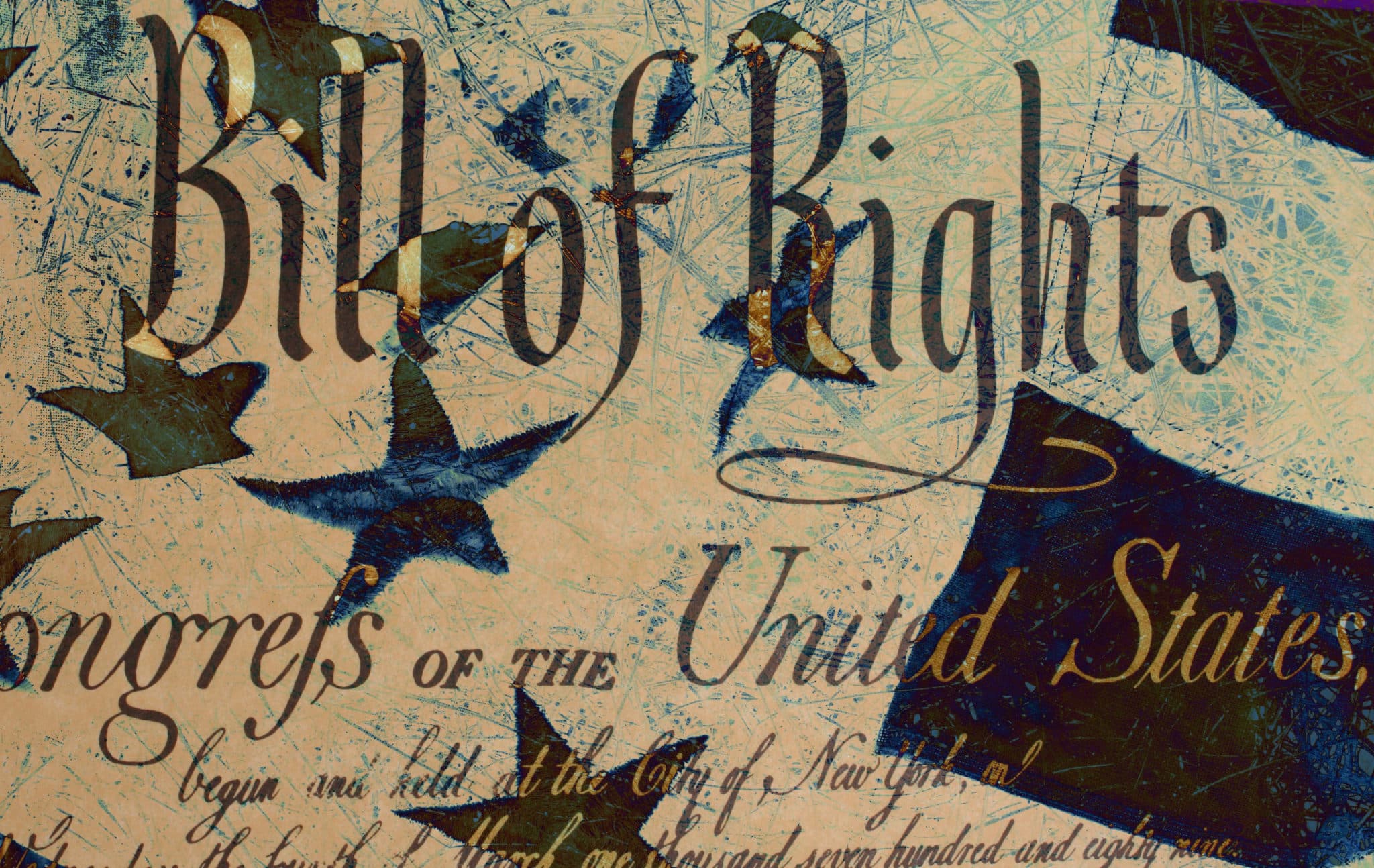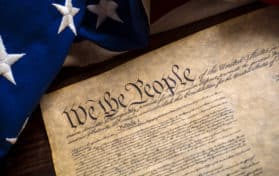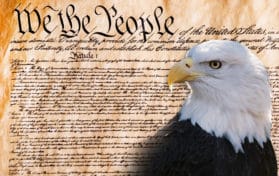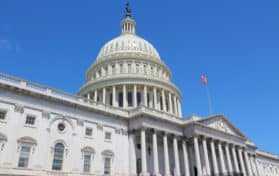
The Bill of Rights: A Brief History
One of the most famous quotes from the Bill of Rights is the specification that the document is “the enumeration in the Constitution, of certain rights, shall not be construed to deny or disparage others retained by the people.”
In other words, the Bill of Rights lays out rights of the individual. The document explains the most important rights of the American people, and it is meant to protect citizens against the infringement of those rights by the government.
Transcription:
The Preamble to The Bill of Rights
Congress of the United States
begun and held at the City of New-York, on
Wednesday the fourth of March, one thousand seven hundred and eighty nine.
THE Conventions of a number of the States, having at the time of their adopting the Constitution, expressed a desire, in order to prevent misconstruction or abuse of its powers, that further declaratory and restrictive clauses should be added: And as extending the ground of public confidence in the Government, will best ensure the beneficent ends of its institution.
RESOLVED by the Senate and House of Representatives of the United States of America, in Congress assembled, two thirds of both Houses concurring, that the following Articles be proposed to the Legislatures of the several States, as amendments to the Constitution of the United States, all, or any of which Articles, when ratified by three fourths of the said Legislatures, to be valid to all intents and purposes, as part of the said Constitution; viz.
ARTICLES in addition to, and Amendment of the Constitution of the United States of America, proposed by Congress, and ratified by the Legislatures of the several States, pursuant to the fifth Article of the original Constitution.
Note: The following text is a transcription of the first ten amendments to the Constitution in their original form. These amendments were ratified December 15, 1791, and form what is known as the “Bill of Rights.”
Amendment I
Congress shall make no law respecting an establishment of religion, or prohibiting the free exercise thereof; or abridging the freedom of speech, or of the press; or the right of the people peaceably to assemble, and to petition the Government for a redress of grievances.
Amendment II
A well regulated Militia, being necessary to the security of a free State, the right of the people to keep and bear Arms, shall not be infringed.
Amendment III
No Soldier shall, in time of peace be quartered in any house, without the consent of the Owner, nor in time of war, but in a manner to be prescribed by law.
Amendment IV
The right of the people to be secure in their persons, houses, papers, and effects, against unreasonable searches and seizures, shall not be violated, and no Warrants shall issue, but upon probable cause, supported by Oath or affirmation, and particularly describing the place to be searched, and the persons or things to be seized.
Amendment V
No person shall be held to answer for a capital, or otherwise infamous crime, unless on a presentment or indictment of a Grand Jury, except in cases arising in the land or naval forces, or in the Militia, when in actual service in time of War or public danger; nor shall any person be subject for the same offence to be twice put in jeopardy of life or limb; nor shall be compelled in any criminal case to be a witness against himself, nor be deprived of life, liberty, or property, without due process of law; nor shall private property be taken for public use, without just compensation.
Amendment VI
In all criminal prosecutions, the accused shall enjoy the right to a speedy and public trial, by an impartial jury of the State and district wherein the crime shall have been committed, which district shall have been previously ascertained by law, and to be informed of the nature and cause of the accusation; to be confronted with the witnesses against him; to have compulsory process for obtaining witnesses in his favor, and to have the Assistance of Counsel for his defence.
Amendment VII
In Suits at common law, where the value in controversy shall exceed twenty dollars, the right of trial by jury shall be preserved, and no fact tried by a jury, shall be otherwise re-examined in any Court of the United States, than according to the rules of the common law.
Amendment VIII
Excessive bail shall not be required, nor excessive fines imposed, nor cruel and unusual punishments inflicted.
Amendment IX
The enumeration in the Constitution, of certain rights, shall not be construed to deny or disparage others retained by the people.
Amendment X
The powers not delegated to the United States by the Constitution, nor prohibited by it to the States, are reserved to the States respectively, or to the people.
The Bill of Rights Explained
Most Americans are familiar with certain aspects of the Bill of Rights.The First Amendment deals with the freedom of the press, speech, religion, petition – the right to protest without fear of governmental retribution, and assembly (peaceful protests).
The Second Amendment is a hotly contested one, so it’s very familiar. It deals with personal ownership of guns; however, many don’t know the complete right in order to maintain a well-regulated militia.
The statement “well-regulated militia” means that individuals have the right to carry a firearm in order to protect themselves, their families, and their property.
The Third Amendment was a direct result of British soldiers demanding lodging in American homes during the Revolution; it states that United States citizens are not required to house soldiers.
The Fourth Amendment is one that is often cited during law enforcement proceedings; it prevents illegal search and seizure. In other words, if you are stopped as a result of speeding, the police officer can’t search your car without cause.
Many Americans have heard of someone “pleading the Fifth;” this Amendment means that one is not required to incriminate him or herself in a crime. The Amendment also covers incidents of double jeopardy – the promise that one cannot be tried twice for the same crime. The Fifth also constitutes the due process of law or “innocent til proven guilty.”
The Sixth Amendment is closely tied to the Fifth as it also denotes the rights of an accused person; it lays out the promise of a speedy trail and one that is public.
The Seventh Amendment details one’s right to a trial by jury in civil cases. The Eighth Amendment provides relief from cruel and unusual punishment as well as excessive bail.
The Ninth and Tenth Amendment lay out the rights of the people as well as powers that are reserved to the state.
Frequently Asked Questions
Who wrote the Bill of Rights?
While the chief writing of the Bill of Rights is attributed to Founding Father James Madison, Thomas Jefferson was an inspiration in the drafting of the document. It should also be noted that The Anti-Federalist Papers and their authors served as inspiration for the Bill of Rights.
Jefferson himself said, “(A) bill of rights is what the people are entitled to against every government on earth, general or particular, and what no government should refuse.”
Why is the Bill of Rights Important?
When the Bill of Rights was drafted, several of the original states were reluctant to provide support for the Constitution as it was written. The Bill of Rights set specific boundaries for government power, including that of politicians as a governmental body, the military, and law enforcement.
Overall, the Bill of Rights offers protection for individual liberties.
Why are the first ten amendments called the Bill of Rights?
The Founding Fathers behind the Bill of Rights wanted to promote individual liberties, place limits on a centralized federal government, and set out the rights of states as well.
The Founding Fathers believed these rights were naturally given to citizens of America.
Can the Bill of Rights be changed?
Yes, but it is a convoluted process; only the legislature can change the Bill of Rights. Congress is typically loathe to make outright changes to the Bill of Rights as people see any changes as an infringement upon one’s individual rights.
What would happen without the Bill of Rights?
While it’s not possible to predict exactly what would happen, the Founding Fathers believed without a Bill of Rights, the federal government could become oppressive and “too distant from the people to be controlled.”
How many amendments are in the Bill of Rights?
There are ten amendments in the Bill of Rights.
When was the Bill of Rights written?
The Bill of Rights was written in 1789, and it was heavily influenced by the Virginia state Constitution as well as the Magna Carta.
When was the Bill of Rights ratified?
The entirety of the Bill of Rights was ratified in December 1791.
Why is the Bill of Rights important today?
The Bill of Rights is hotly contested, even over 200 years later. The Second Amendment is always a political issue, particularly within the last twenty-five years. During the 1960s, many individuals had their First Amendment rights infringed upon during the Civil Rights Era.
Today, as we see much legislation being presented to Congress, Americans differ on whether some proposed laws are an infringement upon our individual rights as they are laid out in the Constitution.
We also see that the Fourth, Fifth, Sixth and Seventh Amendments are also important as court cases can be overturned if a judge determines an accused person’s rights have been violated.





